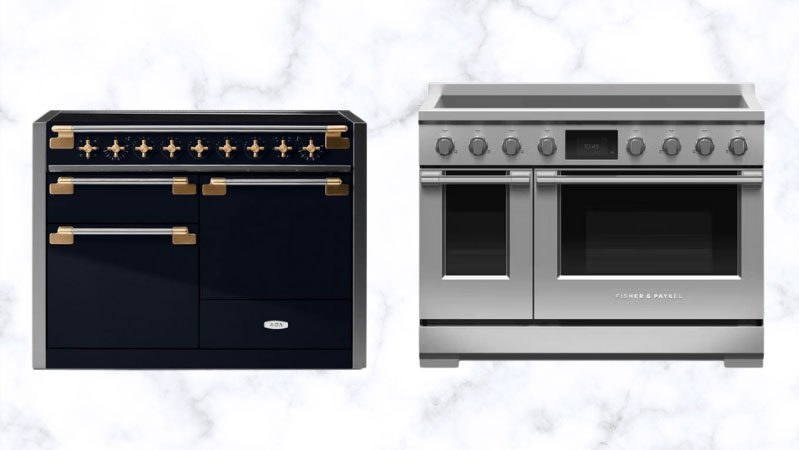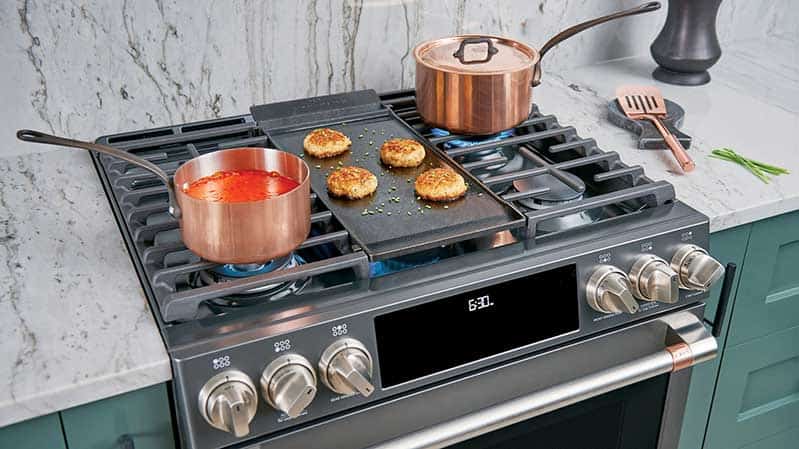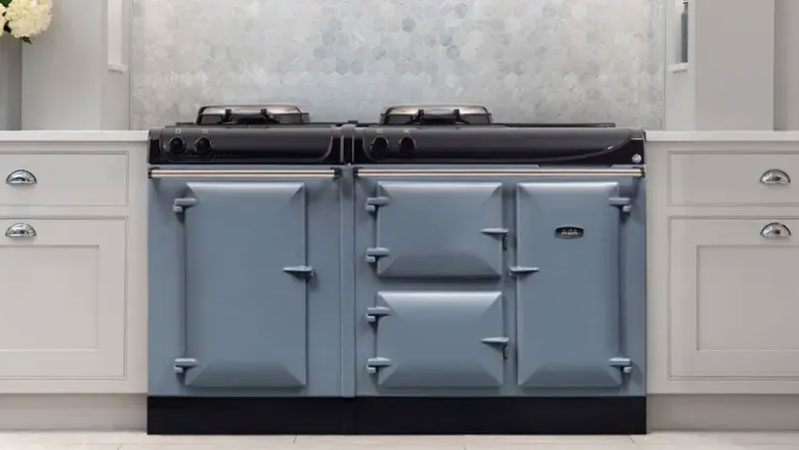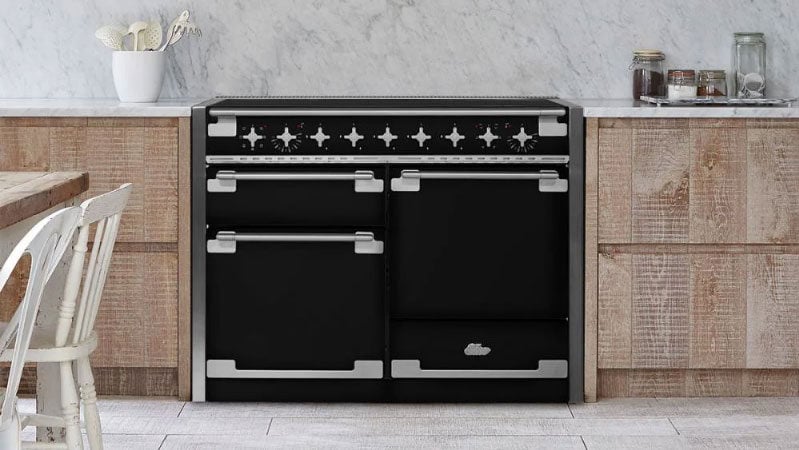The Elise 48-inch induction range is brand new and interesting.
AGA is a good-looking range with some functionality and maybe a few issues.
In this article, we will review both.
By the end, you'll know whether to buy the AGA Elise range now or wait for the upcoming 48-inch models from BlueStar and Fisher & Paykel.
Let’s get started.
The Rush to 48-Inch Induction Ranges

Right now, companies are in a rush to manufacture 48-inch induction ranges.
The reason?
For multi-family housing, gas is now banned in New York, California, and Massachusetts.

So, induction is the alternative to the gas and dual fuel professional ranges for luxury developments.
Our blog features an article that thoroughly explains the differences between dual fuel and gas ranges.
You don't have many choices until the end of 2024.
Lesser-known Fulgor Milano and AGA currently offer 48-inch induction ranges, with Fisher & Paykel and BlueStar set to launch their new models later.
But AGA is the most unique of the four.
Looking for answers about Induction Cooking?
Short on time? Download our free Induction Cooking Buying Guide.
Who Is AGA?
The AGA range is said to have been designed by Nobel Prize-winning physicist Gustaf Dalén.

Originating from Sweden, Gustaf initially gained fame for creating lighting and navigational beacons, including those that illuminated the Panama Canal.
After losing his sight in an accident and recognizing the constant attention his wife had to give to their conventional stove, Gustaf designed the original AGA stove.

It was simple to use, always on, and had minimal controls, making it accessible for someone who was blind.
The early AGA cookers quickly became popular in the UK, serving dual purposes as heaters and stoves, and the company was subsequently established there.
My Experience With AGA

The AGA ranges of the 1980s and 1990s were still the “always-on” types. It's a good idea in New England until roughly the middle of May.
I remember talking to the rep who was practically roasting in his showroom in July. We had the same experience at Yale after putting one of these ranges on display.
The older ranges also had to be vented, and only one man in New England was licensed to do it.
Eventually, we just stopped selling AGA - it was just too hard to coordinate.
Then, in 2015, US-based Middleby bought AGA and associated brands, most notably La Cornue.
AGA Presently

The recent AGA is completely different.
The famous cast iron range is no longer "always on" and has controls.
The Mercury Series has more basic controls, and the word Mercury is emblazoned on the bottom.

Elise is their most popular series with refined handles and words emblazoned at the bottom.
AGA is certainly not an American range with a larger and smaller oven.
Instead, it's distinctively European, featuring:
- Smaller ovens designed for cooking in different compartments, allowing for more versatility and efficiency in meal preparation.
Smaller ovens designed for cooking in different compartments, allowing for more versatility and efficiency in meal preparation.AGA reminds me more of the French-inspired Lacanche range.
4 Reasons to Buy the AGA Elise Range
Let's have a look at the reasons for buying it. Then, we'll cover some issues.
Reason One: AGA Elise Style

I never comment on style because everyone's idea of style is different.
But these ranges are good-looking, especially in color. The AGA Elise series ranges offer 14 color options:

They are so nice that dark blue is known as the more refined "Indigo."
Red is not red but "Piccadilly Red."
The cross-handle knob is a bit more elegant than the standards as well.
AGA also offers six choices for the handles:

So, if you are looking for a unique-looking range, this range is a great option.
Reason Two: AGA Elise Price
Fisher & Paykel is 15,499. BlueStar will be around $16,000. Yet the Elise is just over $11,000.
Reason Three: Induction Stovetop
Despite its lower price, the AGA Elise offers five induction zones: three seven-inch burners, one six-inch burner, and one ten-inch burner.
Three of these burners can reach over 3000 watts when boosted.

There are three induction-boosted burners: one 3700-watt, three 3000-watt, and one 2200-watt, providing you with decent output.
Reason Three: Glide-Out Broiler

My mom used to broil as her preferred mode when I was growing up.
Her charring aside, AGA has an interesting glide-out broiler.
It's a dedicated waist-high compartment on the left.
When you broil, you typically place the food near the element, yet Elise does that for you without moving the racks.
The modes are "Full" and "Half Broil", and the broiler can accommodate up to six steaks.
Reason Four: Side-Swing Oven Doors

Instead of folding down like traditional stoves, the ovens swing open.
Swing doors are better because you don't have to lift heavier items over a door. You swing the door open for immediate access to the oven.
Below the main oven is a storage drawer for pots and pans.
Problems With AGA Elise Induction Range
Problem One: Induction Cooktop
The cooktop is powerful enough, but you can't combine two elements.
This is a minor issue for cooking in an oblong pan greater than 10 inches.
Then again, I saw a chef cook with an oversized griddle on a smaller induction burner.
It still worked.
Problem Two: Ovens
The main oven (right side) has a capacity of 2.8 cubic feet. The second oven (left side) also has a capacity of 2.8 cubic feet.
The third compartment is a broiler with a capacity of 0.5 cubic feet.
The ovens measure 17 inches high by 14 inches deep by 14.5 inches wide in each.
Size is on the smaller size and could be a problem depending on how you cook.
Overall, the Elise is a beautiful five-zone induction range with a good broiler and smaller-sized ovens.
Comparing the AGA Elise to the Fisher & Paykel Series 11 Induction Range
.jpg?width=799&height=450&name=AGA-Elise-Series-Induction-Range-vs-Fisher-Paykel-Series-11-Induction-Range-(1).jpg)
Let's compare it to the Fisher & Paykel Series 11 Induction Range, the RIV3-486.
Price
The AGA Elise is priced at $11,079, while the Fisher Paykel RIV3-486 costs $15,499.
Style
The AGA Elise offers 14 finishes and six handle options, while the Fisher & Paykel comes in stainless steel only.
Induction Top
You have five zones in the AGA.
However, the Fisher & Paykel is better, with six zones and two bridge elements:

So, while the AGA Elise offers plenty of cooking flexibility, the Fisher & Paykel takes it up a notch with an extra zone and the handy bridge elements for larger cookware.
Ovens
Fisher & Paykel is a more standard 48-inch range with a total capacity of 4.8 cubic feet (3.8 cubic feet usable) in the main oven and 2.1 cubic feet in the smaller oven.

So, choosing between AGA's Elise series and Fisher & Paykel's Series 11 induction ranges depends on the larger oven and what you typically cook.
Fisher & Paykel is also self-cleaning and is more of a conventional stove with a digital clock.

The smart functionality on the Fisher & Paykel will allow you to control the range remotely. You also have access to recipes in the App.
The AGA Elise does have unconventional side-swing doors. You should check out the design at your local store—and hopefully at ours in the near future.
Expert Tip: Want to know whether a stove or dishwasher can fit your favorite pan? Bring it in the store and try it with the range or dishwasher.
Is the New AGA Elise 48" Induction Range Right for You?
Buying the new AGA Elise induction range depends on how you cook.
First, the Elise is attractive and affordable compared to the other 48 induction ranges.
The Elise is a great choice if you are looking for a unique and attractive option.
The cooktop and broiler are decent, but the ovens may be too small for your cooking style.
You also don't have a clock, timer, or smart functionality.
Still, it is a unique option in a sea of similar-looking ranges. That is until the 1000-color BlueStar induction debuts later this year.
Thanks for reading. We'd love to hear your thoughts. Leave your comments below.
Additional Resources
Want to know the best induction brands and products and have a better understanding of how induction works? Download the Yale Induction Cooking Buying Guide with features, specs, and inside buying tips. Over 1 million people have read a Yale Guide.
Related Articles


















.jpg?width=799&height=450&name=AGA-Elise-Series-Induction-Range-vs-Fisher-Paykel-Series-11-Induction-Range-(1).jpg)


